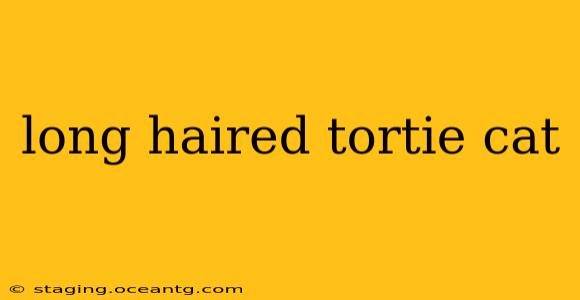The captivating allure of a tortoiseshell cat is undeniable, with their striking patchwork of colors. But what happens when that classic tortoiseshell coat is coupled with luxurious, long fur? You get a long-haired tortie—a truly stunning feline companion. This unique combination creates a cat that's not just visually arresting, but also possesses a personality as complex and beautiful as its coat. This guide delves into everything you need to know about these magnificent creatures.
What is a Long-Haired Tortoiseshell Cat?
A long-haired tortoiseshell cat, often called a longhair tortie or simply a "tortie longhair," isn't a breed in itself. Instead, it's a description of a cat's coat and coloring. The "tortoiseshell" (or "tortie") pattern refers to the mottled coat of orange and black (or cream and brown) patches. The "long-haired" part simply means the cat has a longer, often plush or semi-long, coat compared to the short-haired domestic shorthair. This long fur can be found in various breeds that exhibit the tortoiseshell pattern, making each long-haired tortie unique.
The genes responsible for the tortoiseshell pattern are linked to the X chromosome. Since female cats have two X chromosomes, they're much more likely to exhibit this coloration. Male torties are extremely rare and typically result from genetic anomalies. The long hair gene can be present in various breeds, leading to a delightful range of appearances in long-haired torties.
What Breeds Can Be Long-Haired Torties?
Several cat breeds can exhibit the long-haired tortie pattern. Some of the most common include:
- Maine Coon: Known for their large size and fluffy coats, Maine Coons can occasionally have tortoiseshell coloring. A long-haired tortie Maine Coon is a truly impressive sight.
- Persian: The Persian breed is famous for its incredibly long and luxurious coat, and some Persians exhibit the beautiful tortoiseshell pattern.
- Himalayan: Closely related to Persians, Himalayans also sport long fur and can display the tortoiseshell coloring.
- Ragdoll: While less common, Ragdolls can also be long-haired torties, adding another dimension to their already captivating appearance.
It's important to note that many long-haired torties are domestic cats without a specific breed designation. Their long hair could simply be the result of genetic variations within a mixed breed background.
What is the Temperament of a Long-Haired Tortie?
While generalizations about cat personalities are always risky, long-haired torties, like many torties in general, are often described as having spirited, independent, and sometimes quirky personalities. They are known to be:
- Intelligent: They are often quick learners and can be easily trained with positive reinforcement.
- Affectionate (but on their own terms): While loving, they might not always be overtly cuddly. They'll show affection in their own way, perhaps through playful interactions or gentle head bumps.
- Opinionated: They're not afraid to let you know what they want!
- Playful: Their playful nature is a joy to witness, making them entertaining companions.
Are Long-Haired Torties High-Maintenance?
The long hair necessitates more grooming than a shorthaired cat. Regular brushing is essential to prevent mats and tangles, ideally several times a week. You'll also want to pay attention to their ears and eyes to keep them clean. Professional grooming may be necessary depending on the length and texture of the fur.
How Much Do Long-Haired Torties Cost?
The cost of a long-haired tortie can vary widely depending on several factors:
- Breed: Purebred long-haired torties from reputable breeders will typically cost more than mixed breed cats.
- Breeder: Reputable breeders who prioritize the health and well-being of their cats may charge higher prices.
- Location: Prices can vary geographically.
Do Long-Haired Torties Shed a Lot?
Yes, long-haired torties do shed more than their shorthaired counterparts. Regular brushing is crucial to manage shedding and keep their coat healthy.
Are Long-Haired Torties Healthy?
Like all cats, long-haired torties are susceptible to certain health problems. However, responsible breeding practices can significantly reduce the risk of many hereditary conditions. Regular veterinary checkups are crucial for early detection and treatment of any potential health issues.
This comprehensive guide provides a starting point for understanding the wonderful world of long-haired tortoiseshell cats. Remember, every cat is an individual, and your long-haired tortie's personality and needs will be unique to them. Enjoy the journey of sharing your life with this beautiful and captivating creature!
